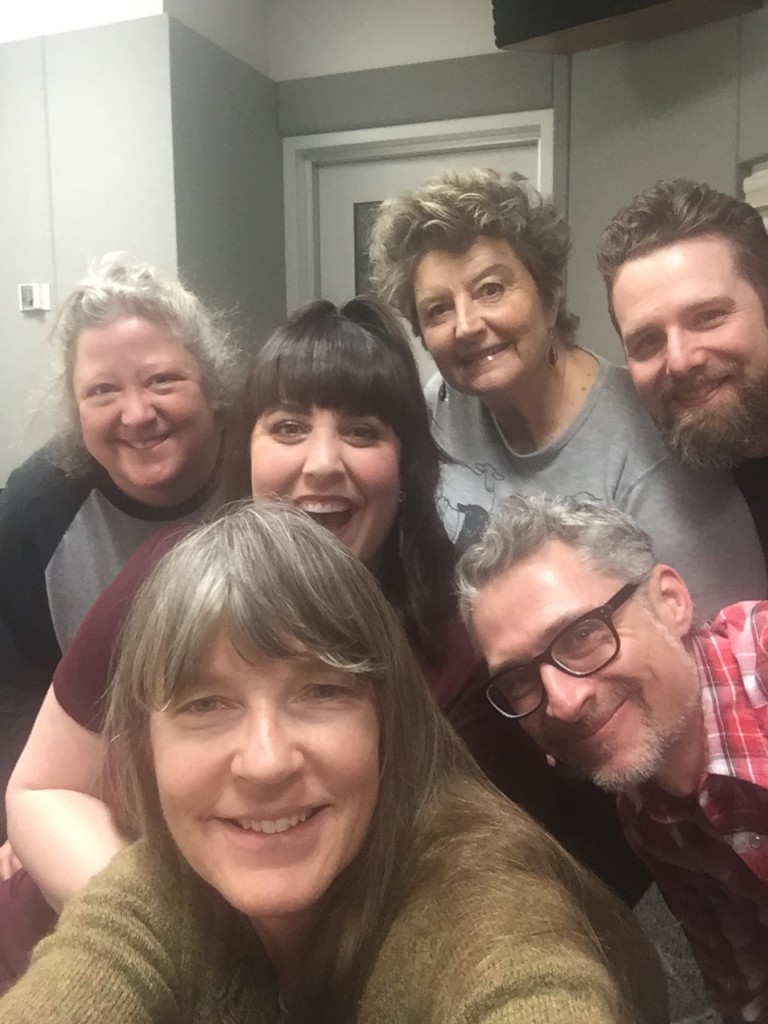NOTE: On Friday, Dec. 13, at 11 a.m., The Utah Review will live blog the only live performance of Radio Hour Episode 14: Circle, produced by Plan-B Theatre and KUER-FM’s RadioWest program. Tune into KUER-FM 90.1 and follow The Utah Review during the broadcast.
“Yes, we’ve been doing Christmas lately, but it’s always ‘dark’ or ‘twisted’ Christmas, which is the best kind of Christmas, in my opinion,” Cheryl Cluff, Plan-B Theatre managing director, says
Cluff will direct Circle, the 14th episode of its Radio Hour series as part of Plan-B’s partnership with RadioWest, hosted by Doug Fabrizio on KUER-FM (90.1). Circle will premiere Friday, Dec. 13, at 11 a.m. during the live RadioWest Friday broadcast. This will be the sixth episode in the series’ history to receive only one live performance in KUER-FM’s studios without an audience.

All 14 episodes also will be available for streaming at the RadioWest website.
Circle might yet be the most effective, unconventional take on the holidays but the reason for the season also is not lost in the narrative. Bennett, in his 11th turn as a Radio Hour writer, sets the story in the middle of the 2040s, 15 years after the American imperialist failure in Iran. Half of Wyoming and Utah is buried in three feet of ash. The cast of characters includes an Israeli ambassador and his son, Russians and beings with artificial general intelligence capabilities, who are set to launch a global ‘Rehabilitation.’
Bennett says the emotional inspiration for Circle comes from the Biblical story of Sodom and Gomorrah in Genesis 19. “I should say that I regard the story as mythology, not history,” he explains. “But as mythology what does it mean? How should we react to stories of mighty sky-beings laying waste to entire cities? For our own good?” He focuses on a significant aspect of the Biblical narrative that often has been overlooked, the occurrence of genocide despite Abraham’s pleas for mercy. “I’m pitting my characters against the existential fear of Lot facing a mini-apocalypse,” he says.

As for the intellectual bearings regarding artificial general intelligence (AGI), Bennett, as usual, has done his research. Currently, the state of artificial intelligence and deep learning technologies has generated research where AI can discern individual’s non-obvious characteristics (such as sexual orientation) merely by scanning their image. AI systems have been trained to beat humans competing at champion levels in games such as chess and natural language processing has been developed extensively in chatbots and other applications that simulate a typical conversation.
However, Bennett sets his sights to technology that has been conceptualized but not realized for AGI. Some scientists believe that the technology could be developed by the end of the 2020s, and even the most conservative estimates believe that this will be accomplished before the end of the century. One source of inspiration is the 2019 book Possible Minds: Twenty-Five Ways of Looking at AI, written by John Brockman who interviewed a group of the most widely respected scientists in the discipline.
“Intellectually, I think it’s imminently possible that human beings will build an artificial general intelligence that could outstrip us in rationality, the physical sciences, and even in philosophy of life,” Bennett says, adding that like other writers, including Wired Magazine’s Kevin Kelly, he believes science fiction is being accepted as a new theology. “The mainstream religions, by and large, are not practically focused on what life will be like following the apocalypse. At best, their ideas about it are vague and hopeful. By contrast, science fiction writers (along with bioethicists) are posing detailed scenarios for what human life would be like if we coexisted with beings much more powerful than us.”
In the story for Circle, Bennett touches on two fascinating and consequential points: whether or not the sentient AGI is equal to human beings and whether or not human beings are politically prepared to the deal with the presence and promise of AGI for reasons other than imperialism and nationalistic domination. Indeed, it’s a Christmas tale unlike any other, with virtual reality, scenes set on the moon, and instances of embodied and disembodied AGI.
The cast features Jay Perry, who has performed in every Radio Hour episode; Olivia Custodio, who is in her second turn with the series, and Teresa Sanderson, who has appeared in numerous episodes.
“I’m struck by the immensely detailed and complex world Matt has created for this episode. He has placed us just a little forward in time, in a future that could so easily be reality, and has filled it to the brim with detail,” Perry says. “Each of Matt’s plays are stunningly well thought out, but this one feels like diving into a fully immersive science fiction novel.”

Custodio looks forward to rendering a world far different from Troll, last year’s Christmas episode that expanded greatly upon the delightfully dark premises of the Brothers Grimm fairy tale The Frog Prince. “Last year we got to play in a fairy tale and this year we’re deeply submerged in a fantastical (and yet quite plausible) sci-fi world…how lucky are we?!” she explains. “It’s my favorite thing about being an actor; the opportunity to disappear into worlds that we used to so regularly imagine as children.”
Joining Cluff, who handles the sound effects, and the actors are Jennifer Freed (eFoley) and Dave Evanoff (music). “My favorite sound effect at the moment is the rover vehicle on the moon, which is a golf cart on gravel,” Cluff explains. As for Evanoff’s scoring, she describes it as “synthesized retro-futuristic.”
For more information see Plan-B’s website.
